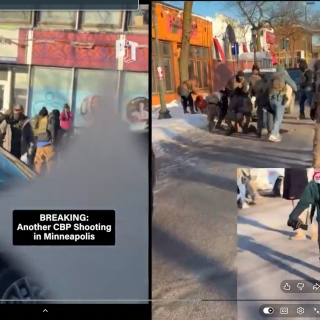Columbus Police Chief Elaine Bryant repeatedly stated during her first four months of leadership that she will hold her officers accountable for any misconduct.
As recently as October 6 at the meeting of the Columbus Metropolitan Club, in response to the recent arrests of two Division of Police narcotics officers accused of selling large amounts of fentanyl and cocaine, Bryant told the audience, "Any time we find officers that are doing wrong we want to hold them accountable so if these allegations are proven to be true we will hold every single person accountable for everything they are found to do that are not within the standards of this division. Period."
One month ago, she was given the opportunity to discipline three supervisors who participated in retaliatory actions against Columbus Police Lieutenant Mellissa McFadden in connection with her book, Walking the Thin Black Line: Confronting Racism in the Columbus Division of Police, released September 2020.
Marc Fishel, an independent attorney retained by former Safety Director Ned Pettus to investigate nine Equal Employment Opportunity (EEO) claims made by McFadden earlier this year, conducted a six-month investigation and submitted his findings on September 10, 2021.
Columbus Police Deputy Chief Knight had filed a lengthy complaint against McFadden and her book. Bryant has not yet determined the disciplinary actions to be taken against Knight.
Fishel’s investigation also found that Commander Mark Gardner and Sergeant Sally Fisher, who at the time were working in the Internal Affairs Bureau (IAB), retaliated against McFadden for writing her book. Fishel was concerned that they fabricated a narrative that McFadden was affiliated with Black Lives Matter, who they considered to be a hate group.
Is Black Lives Matter a hate group?
McFadden’s EEO complaints would have been investigated by IAB, but because her claims were focused in large part on actions taken by IAB, the Safety Director chose to send the complaints to Fishel.
McFadden does not know what discipline will be handed out. She said, “I have no faith in the system. I hope the new chief can transform the culture which has not held any deputy chief or Internal Affairs Bureau commander accountable for discriminatory actions.”
The Rev. Dr. Jeffrey P. Kee, senior pastor of New Faith Baptist Church, agrees. He sees the leaders of the Division perpetuating this retaliatory culture.
He said, “We know there is a profound distrust of the Columbus Division of Police in the Black community. We applaud and wish Chief Bryant well in transforming the system that has kept Black and brown people oppressed. We have seen over and over again that this police department has not been held accountable. Officers are fearful of coming out and sharing their experiences.”
McFadden's memoir details numerous facts which support her allegations of discrimination, sexism, and racism within the Division, according to Fishel’s 322-page report. But in her complaint, Knight did not dispute the facts in the book. Instead, she took offense with McFadden's opinions, which are First Amendment protected speech.
Fishel wrote in his report, “It seems DC Knight’s characterization reveals her true feelings. She is offended and angry about how Lt. McFadden views these matters, and [Knight] wants her to be investigated and possibly disciplined as a result.”
Fishel noted there are substantial First Amendment issues associated with disciplining an employee for statements they make about their public employer. McFadden has already been disciplined for writing the book – she was given “documented constructive counseling” for not asking for permission to take on a side job of writing a book.
McFadden’s attorney, Sam Schlein, explained in a written comment that, “The First Amendment protects all public employees in matters of speech of public concern. Discrimination is a matter of significant public concern especially in light of the continued issues our nation faces with racial inequities and discrimination in all workplaces including the Columbus Division of Police. The First Amendment does and must protect public employees’ rights to speak on important issues that the whole of society discusses on a day-to-day basis without fear of reprisal and retribution.”
Fishel determined that Knight’s complaint rose to the level of retaliation against McFadden for using her First Amendment right to expose discrimination and previous retaliation that McFadden had suffered, including actions initiated by Knight. McFadden also has a federal case against Knight and the City, scheduled for trial in January seeking compensation for Knight’s earlier actions.
Both Gardner and Fisher were reassigned out of IAB by Bryant when Fishel submitted his report which determined they had also retaliated against McFadden. As embarrassing as being removed from their assignments under these circumstances might be, Bryant’s action is not considered discipline.
Knight was also removed from her position as IAB Commander in 2017 after retaliating against an officer with whom McFadden helped file an EEO complaint. Knight was never fully investigated nor disciplined for that action.
The Chief has four choices for discipline. Bryant can give them documented constructive counseling, a written reprimand, departmental charges including suspension or termination, or refer the cases to the city attorney for criminal charges. Equal Employment Opportunity retaliation is a violation of federal law.
When investigations are completed, the cases go back to each officers' chain of command for recommended discipline. When they arrive at the Chief’s desk, she would ask the discipline and grievance officers at the Division for a "just cause" review. This review is based on a standard established in 1964 which asks seven questions to determine if a discipline or discharge will stand up as having a just cause.
Public Information Officer James Fuqua declined to comment on where the discipline decision currently is in this process, saying that it is an ongoing investigation.
In her book, McFadden shares examples of how she has been a tireless supporter of officers experiencing discrimination. This has placed her in the crosshairs of those in the division intent on maintaining the status quo. In a letter to City Attorney Zach Klein, Knight’s attorney, Zachary Gottesman, maintained that McFadden’s charges of discrimination are not protected speech and therefore in defending herself against them, Knight's actions could not be classified as retaliation.
Reacting to Gottesman’s letter, Schlein wrote, “McFadden’s comments were protected by the First Amendment as they were a matter of public concern. We are pleased that the Division took McFadden’s complaints of retaliation seriously and brought in an outside firm to investigate. We believe that all of the discipline issued out of the investigation will be well founded based on Division policies.”



